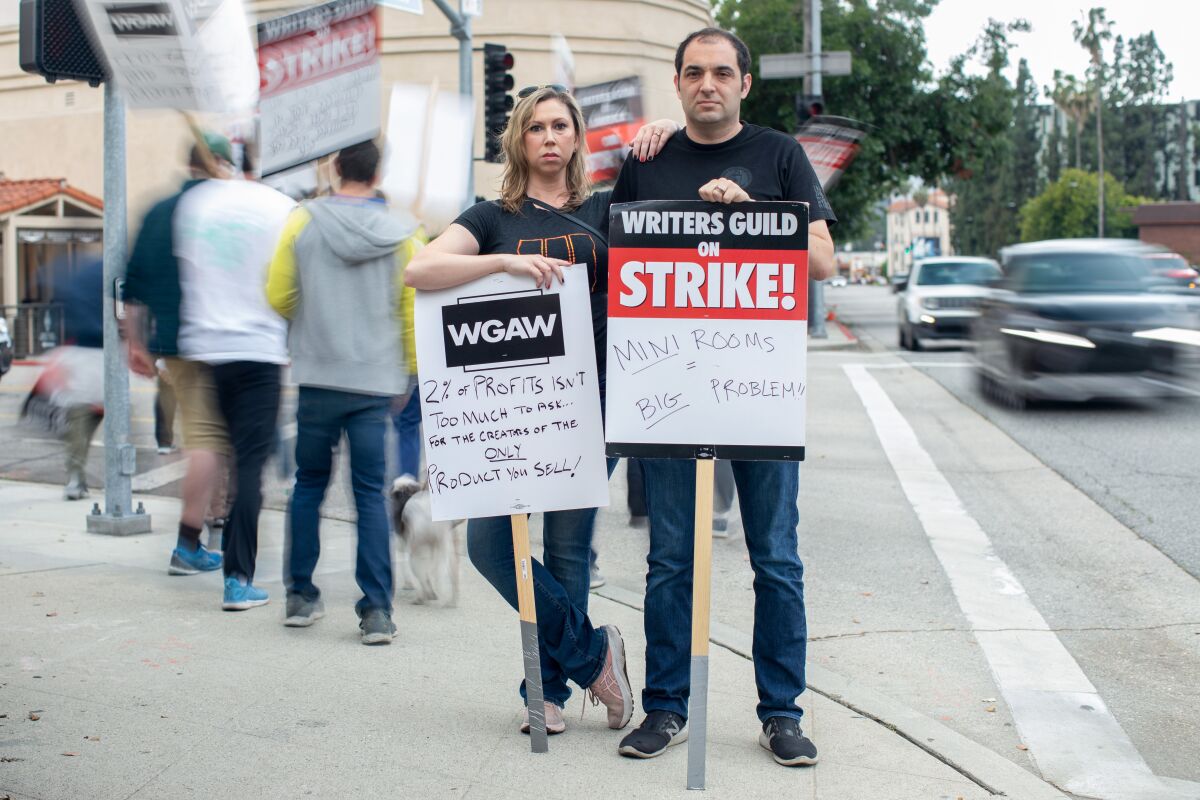
Writer and actor Katie J. Stone and writing partner David Daitch picket at Warner Bros. Studios in Burbank.
(Myung J. Chun / Los Angeles Times)
Writing team Katie J. Stone and David Daitch are not complaining. They are keenly aware that they make a solid living by most standards. They’ve been selling a pilot to a network every year for the last four years. That breaks down to about $250,000 for each sale.
But the economics are getting tighter. When the writers don’t have one of their own pilots to push out, they staff others’ writers’ rooms, and the rate they get as a team is about $12,000 a week. That looks impressive on paper, except TV seasons have been reduced from 22 to 25 network episodes to maybe 12 cable episodes or maybe six to eight episodes if the work is on a streamer. Including residuals, the team earns on average a little more than $300,000 annually.
Many slices get carved out of that pie. First, the pie is sliced in half — split evenly between the two college friends and writing partners. From there, each writer pays about 25% to their respective reps — agents, managers, lawyers. Then there are taxes of about 20% to 30%. They also pay an accountant and their guild dues, which can add up to about $7,000 annually.
When it’s all said and done, Stone and Daitch have each pulled down a low- to mid-$80,000s salary, which, Daitch notes, “is a perfectly respectable salary.” But if you break that down to a monthly nut, Daitch doesn’t earn enough to cover his mortgage. Both Stone and Daitch note that they supplement their incomes — Daitch as a naval reservist and Stone as an actress contracted with the Screen Actors Guild.
Stone and her husband — a union musician — live in a rent-controlled, one-bedroom apartment in the San Fernando Valley, and Stone notes that many writers at her level are doing the same. Most are unable to buy a home unless they have money from another source, she says. Daitch says the only reason he owns a home is because his wife is a surgeon and he got a Veterans Affairs loan after four years of active Navy duty straight out of college.
Daitch notes that his mother was a TV writer. In the 1980s, she worked on shows including “Webster,” “Facts of Life” and “The Love Boat.”
“There were a couple of years that her take-home pay from a single year was enough to buy a house in Rancho Park,” Daitch says, adding that she didn’t need a mortgage. Adjusted for inflation, he says, the income he and Stone make is less than 7% of what his mother made. A house his mother could buy in a year, he and Stone would need 30 years combined to buy.
The writers, who both attended USC, met at church, even though they’re both not religious. Daitch’s pursuit of a nice Christian girl and Stone’s presence at the church that day (as a favor to her mother, who asked a well-meaning church-goer’s daughter to look out for Stone in L.A.) resulted in a fruitful professional collaboration. They have grown a solid business with credits including USA Network’s “Shooter” and Netflix’s “Splinter Cell.” The pair also has sold original pilots to Fox, Netflix and ABC.
The success was hard won by both writers, who recall humiliating stints as assistants. Stone worked for a former network boss who took the trash from his pockets — gum wrappers, tissues — and put it into Stone’s hand, rather than walk 5 feet to the garbage; and Daitch went from being a Navy officer to regularly delivering boots to Joey Lawrence’s house in Calabasas, “and he had a lot of boots that needed to go home.” Why boots? “He likes wearing boots,” Daitch says. “And I’m guessing he got them for free.”
But in their hearts, they were always writers, and they made it happen by working in machine-like loops — despite the shrinking rooms, the reduced pay, the dwindling residuals and the burgeoning threat that AI poses to their already precarious livelihoods. They write because, as Stone says, “These are dream jobs. These are the stories we tell that we carry in our hearts. Being a storyteller is a noble profession that has existed since people sat around campfires.”
Plus, they are certain the studios have the money to treat their writers with respect. Daitch notes that 15 years ago Netflix had about 8 million subscribers and its CEO made around $2 million a year. Now writers of Netflix shows are working for a potential audience of 232 million subscribers while, Daitch says, the company’s two CEOs “take home a combined $100 million a year.”
The strike for Stone and Daitch is about setting precedent. During the last strike in ’07 and ’08, the union was working to negotiate around the harm that the rise of streaming was doing to writers’ livelihoods. Today, AI seems poised to do the same — giving writers yet another reason to fight for their future.
Says Stone, “We want to hold the line that writing is a human art, that comes from the human spirit, that needs to be told by people to other people.”
Stay connected with us on social media platform for instant update click here to join our Twitter, & Facebook
We are now on Telegram. Click here to join our channel (@TechiUpdate) and stay updated with the latest Technology headlines.
For all the latest TV News Click Here
